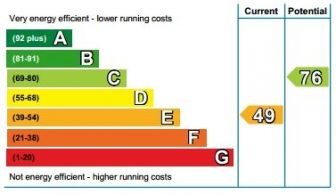 Over a third of all properties currently listed for sale have a EPC rating below a C, although this figure climbs as high as 46% in some major cities, according to the latest research from epIMS, the EPC and energy efficiency platform developed for landlords.
Over a third of all properties currently listed for sale have a EPC rating below a C, although this figure climbs as high as 46% in some major cities, according to the latest research from epIMS, the EPC and energy efficiency platform developed for landlords.
Whilst it’s being widely predicted that changes to capital gains tax will no longer apply to property in tomorrow’s Budget announcement, one initiative that is still expected to impact landlords is Labour’s commitment to a ‘greener’ housing market, requiring all privately rented properties to hold an EPC rating of C or above by 2030.
For those landlords who currently do not meet this criteria, there will likely be a significant cost – estimated to be around £8,000 on average – in bringing the rental property up to standard in England,
The research, based on an analysis of over one million current for sale market listings, shows that across Britain, over a third (33.8%) of potential buy-to-let investment opportunities don’t currently meet the proposed EPC C requirement.
In Wales, this figure stands at 50.1%, in Scotland it’s 45.7%, whilst England is home to the most compliant investment opportunities, although 33.2% of current for sale listings still fail to meet the proposed minimum, as they currently have an EPC rating of D or worse.
The same analysis of for sale stock across 15 major cities by epIMS reveals that Bradford is home to the least energy efficient investment opportunities.
Some 46.2% of all homes currently listed across the city have an EPC rating below a C, with Edinburgh (39.6%), Brighton (39.4%), Bristol (33.9%) and Nottingham (33.5%) also some of the worst offenders in this respect.
London is home to the most energy efficient for sales market at present, although just shy of a quarter (23.5%) of all homes currently listed for sale still only achieve an EPC rating of D or below.
The COO of epIMS, Craig Cooper, commented: “Landlords have had to contend with a raft of legislative changes in recent years, the vast majority of which have dented the financial returns they see from their investment portfolio.
“The requirement to meet an EPC C rating will be the latest initiative that will require many landlords to make further investment, with the average cost of achieving such compliance coming in at around £8,000 per property.
“A greener rental sector is, of course, a positive, however, the issue is that the Government takes a fabric first approach with regard to energy efficiency and that isn’t always the most cost effective route for landlords. For example, small changes such as installing PV panels is far more affordable than internal or external wall installation, but could be just the strategy needed to achieve the C threshold.
“This mitigates the need for landlords to spend more than they have to, which in turn reduces the chance that these costs will be passed onto tenants in the form of rental increases, leading to a far less disruptive landscape for renters themselves.”


Why is there no legislation being discussed requiring homes for sale to have an EPC C rating or above?
There are far more homeowners than landlords, from Govt sources:
“On average across the UK, 61.7% of households were home owners, 19.5% were private renters, and 17.5% were social renters”
Surely if net zero is the target then you aim for the biggest group first.
You must be logged in to like or dislike this comments.
Click to login
Don't have an account? Click here to register
Landlords will always be the first to the guillotine!
You must be logged in to like or dislike this comments.
Click to login
Don't have an account? Click here to register
If it was seriously about green initiatives, surely all new homes built from tomorrow should also been required by law to have heat source air pumps and solar panels rather than expensive retro fit. Its not about the environment its about hitting the little people . Its not even like much of the poor quality housing is owned by private landlord anyway, most of it is owned by councils or trusts who are not targeted by this initiative anyway.
And if landlords are forced to spend money on their properties to comply why can they not see rents will have to go up or properties will be sold if the cost of compliance makes no economic sense. How do either of these help renters in long run.
Spend £800 to save £16 a year. No one in their right mind would bother. Anything where the payback is more than 7-10 years is not worth it. Homeowners know it and don’t bother so why should landlords be forced to make the changes?
You must be logged in to like or dislike this comments.
Click to login
Don't have an account? Click here to register